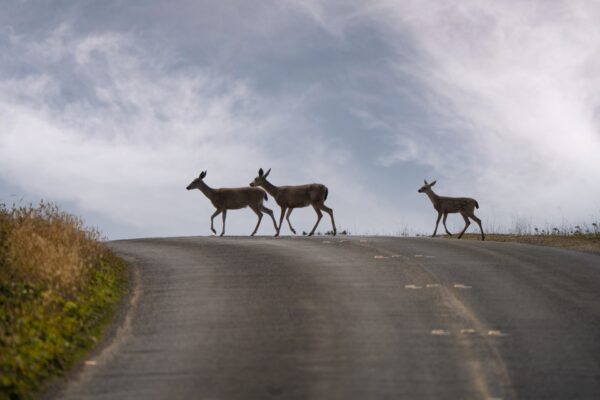
If you hit a deer with your car, will your insurance cover it? If you drive in Maine, you better make sure that it does. Car-deer collisions are a common occurrence and big problem. They can happen anytime throughout the year, but especially in the autumn during mating season. Collisions are so frequent that the Maine DOT has even dubbed November as “Deer Collision Month!”
If you think that car-deer collisions only happen north in Aroostook, Piscataquis, or Franklin counties, think again. From 2005-2014, the Maine Department of Inland Fisheries and Wildlife reported the highest number of deer crashes per county were Cumberland, Penobscot, Kennebec, and York—the State’s most populous counties—in that order. Cumberland County alone had close to 4,500 collisions.
More than simply colliding with a deer, wild animal-vehicle accidents can be serious and costly. In fact, four wild animals in Maine have the potential to total your car in a collision—deer, moose, bear, and wild turkeys (think of a 25-30 pound bowling ball, airborne, approaching your car at 40-50 mph).
However, deer and moose present the biggest problem for drivers, with thousands of collisions happening along Maine roadways every year. Wild animal-vehicle collisions result in more than just roadkill. Vehicle damage is inevitable and sometimes extensive. Injuries to drivers or passengers are not uncommon, are occasionally serious, and, worst-case scenario, fatal—insurance claims for property damage average around $2,600 per accident. Overall, including injuries or fatalities, the average per impact is over $6,000.
Who’s at fault if a deer hits your car?
If you wonder who’s at fault if you hit a deer with your car, it’s not the State, for starters. Maine holds no liability for any claims for damages to your car or motor vehicle by a wild animal or wild bird. However, suppose you happen to have an accidental collision with a deer, moose, bear, or wild turkey. In that case, you must report the collision to a law enforcement officer immediately, as with any accident, or face a fine of up to $500.
Technically speaking, there is no legal fault if you happen to hit a deer or wild animal. Thinking about slamming into an aroused buck sprinting wildly through traffic may keep you up at night, but it won’t land you any time. That’s the good news. On the other hand, hitting a deer or other large animal can result in major vehicle damage. As far as repair costs go, that will depend on your insurance coverage. If you hit a deer, your policy must include comprehensive coverage for your insurance company to cover the cost of repairs to your vehicle. Liability and collision insurance are intended to cover damages in an accident with someone and/or their property, not something such as a wild animal. To add to the confusion, if you manage to swerve to miss the deer but lose control and hit a stone wall or tree, your comprehensive coverage will not cover the damage. Instead, the damages would be covered by your collision insurance—if you happen to be carrying collision on your policy (it is not mandatory in Maine).
Will your rates increase because of the collision?
Because the driver is not considered “at fault” in wild animal collisions, the chances of your rates going up are unlikely. However, no law prevents an insurance company from increasing premiums due to animal-vehicle collisions. There is always a possibility to see an increase at the time of renewal.
Wild animal-vehicle collisions can present other problems. Suppose you or any passenger happen to sustain any personal injuries due to the collision. In that case, your medical payment insurance coverage should typically cover any medical bills that result from the accident. In Maine, the minimum dollar requirement is $2,000 per person in medical payments coverage, but limits of $5,000, $10,000, $25,000, and even higher are available for policyholders.
Multi-car accidents due to animal collisions
Finally, car-deer collisions also run the risk of causing multi-car accidents. The most severe accidents, injuries, and fatalities resulting from deer-related collisions occur when one vehicle swerves in an attempt to avoid hitting the animal. Stopping short could cause a rear-end collision with another car. Swerving at 50 or 60 mph could easily cause a driver to lose control of the vehicle, which could cross lanes into oncoming traffic, or crash into trees, a telephone pole, or another object, or even roll the car over. Such accidents could also damage nearby private property. It may be that in such circumstances that liability becomes an issue, and a personal injury lawyer should be contacted to ensure your interests are protected.
Hitting a deer with your car may be an unavoidable accident and a costly one. As long as you have sufficient insurance coverage, the cost of repairs, damages, and any injuries to yourself or others should be covered. If, however, your car insurance company refuses to pay a claim that you believe should be covered, you owe it to yourself and your family to contact the personal injury lawyers of Hardy, Wolf & Downing for a free consultation.

